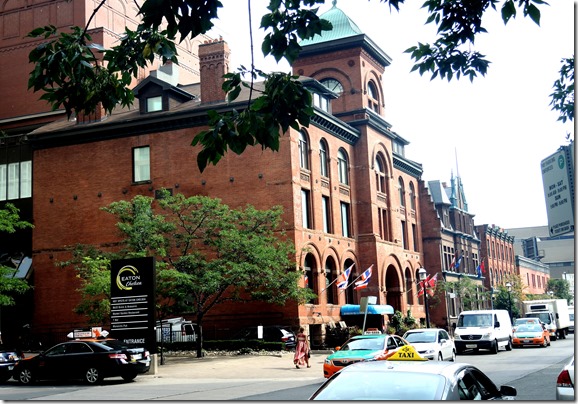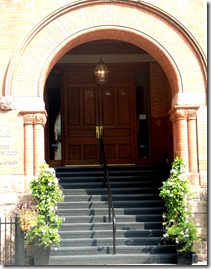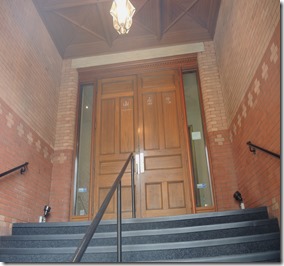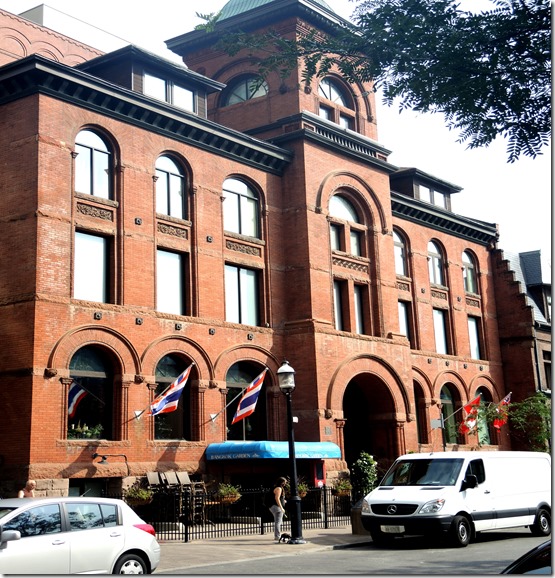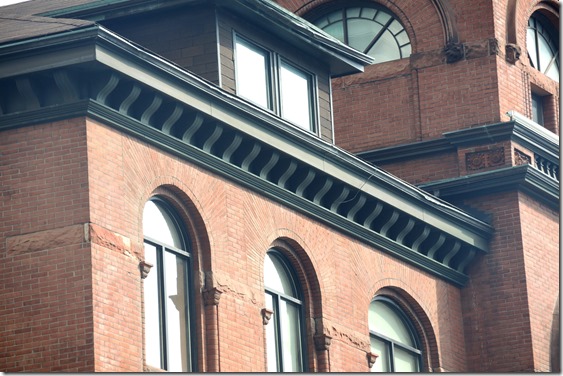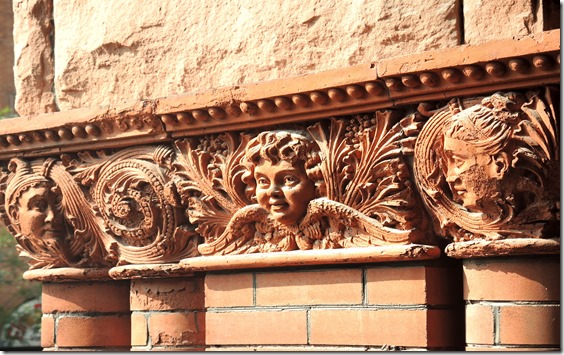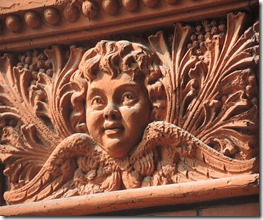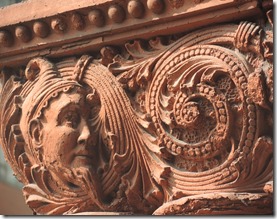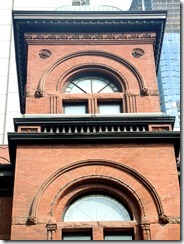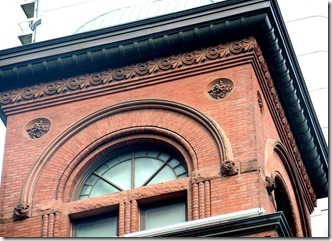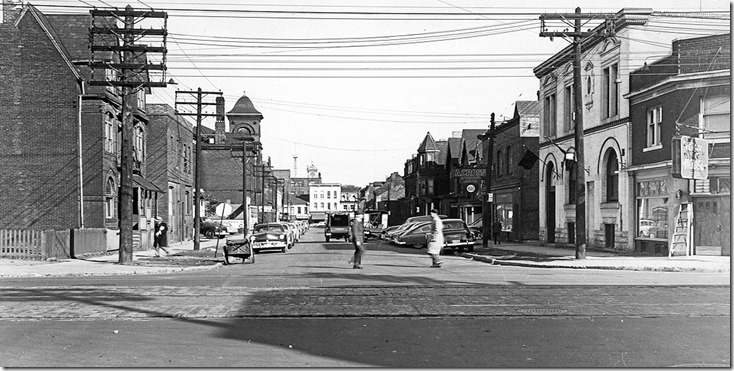The YWCA (foreground) of 1890, on Elm Street, which now houses the Elmwood Club.
This magnificent 19th-century building is at 18 Elm Street, a small street running east-west between Yonge and Bay streets. The historic structure to the east side of the YMCA is the Arts and Letters Club (the former St. George’s Hall), and to the east of it are two other 19th-century structures.
The YWCA was designed by Gordon and Helliwell. An addition was added in 1982, by the architect Andre Ostiguy. These buildings were on Elm Street when the famous Canadian artist, Tom Thomson, arrived in Toronto in 1905. He resided at 54 Elm, renting a room for three years from Joseph K. Walton, a harness maker. Thomson often walked east along Elm Street to attend concerts in Massey Hall of the Toronto Mendelssohn Choir, of which he was very fond. When Tom Thomson arrived in the city, it had a population of 200,000.
The YMCA building at 18 Elm Street was completed in 1890, in the Richardsonian Romanesque style of architecture, similar to Toronto’s Old City Hall. The YMCA has a massive stone base, the facade containing a Roman arch over the entranceway and similar arches above the first and third-floor windows. There are gabled windows in the roof. The symmetrical design has a tower in the central position.
The building today is designated under the Ontario heritage Act as a Heritage site.
Entranceway and solid oak doors on the YWCA, now the Elmwood Club. On either side of the door are side-light windows.
South facade of the YMCA, with its Roman arches, tower in the central position, and gabled windows in the roof.
Third-floor windows and the cornice below the gabled window, on the west side of the tower.
Detailing at the side of the entranceway.
Detailing beside the entrance to 18 Elm Street.
The tower on the building at 18 Elm Street.
Gazing east along Elm Street toward Yonge Street in 1952, the tower on the building at 18 Elm Street visible on the left-hand (north) side of the street. The house where Tom Thomson lived in 1905 can be seen in the foreground, on the left-hand side of the picture, on the northeast corner of Bay and Elm streets. The house has since been demolished.
To view the Home Page for this blog: https://tayloronhistory.com/
To view other posts about the history of Toronto and its buildings:
The Arts and Letters Club, the former St. George’s Hall at 14 Elm Street.
The Ellis Building on Adelaide Street near Spadina Ave.
The Heintzman Building on Yonge Street, next to the Elgin Theatre
The tall narrow building at 242 Yonge Street, south of Dundas
https://tayloronhistory.com/2013/07/10/torontos-architectural-gems242-yonge-st-south-of-dundas/
Toronto’s first Reference Library at College and St. George Streets.
The Commodore Building at 315-317 Adelaide St. West
The Graphic Arts Building (condo) on Richmond Street
The Art Deco Victory Building on Richmond Street
The Concourse Building on Adelaide Street
The old Bank of Commerce at 197 Yonge Street
The Traders Bank on Yonge Street—the city’s second skyscraper
https://tayloronhistory.com/2013/05/22/torontos-architectural-gemstraders-bank-on-yonge-st/
Toronto’s old Union Station on Front Street, built in 1884
https://tayloronhistory.com/2013/05/18/torontos-lost-architectural-gemsthe-old-union-station/
St. Andrew’s Presbyterian Church at King and Simcoe Streets.
https://tayloronhistory.com/2013/05/13/torontos-architectural-gemshistoric-st-andrews-on-king-st/
The row houses on Glasgow Street, near Spadina and College Streets
https://tayloronhistory.com/2013/05/10/torontos-architectural-gemsrow-houses-on-glasgow-st/
The bank at Queen and Simcoe that resembles a Greek temple
The cenotaph at Toronto’s Old City Hall
https://tayloronhistory.com/2013/04/09/torontos-architectural-gemscenotaph-at-old-city-hall/
The magnificent Metropolitan Cathedral at King East and Church Streets
https://tayloronhistory.com/2013/04/02/torontos-architectural-gemsmetropolitan-cathedral/
St. Stanislaus Koska RC Church on Denison Avenue, north of Queen West
The historical St. Mary’s Church at Adelaide and Bathurst Streets
The Bishop’s (St, Michael’s) Palace on Church Street, Toronto
https://tayloronhistory.com/2013/03/02/torontos-architectural-gemsbishops-palace-on-church-street/
The Union Building at Simcoe and King Street West
https://tayloronhistory.com/2013/03/30/torontos-architectural-gemsthe-union-building-on-king-st/
The Ed Mirvish (Pantages, Imperial, Canon) Theatre, a true architectural gem on Toronto’s Yonge Street
The Waverly Hotel on Spadina near College Street.
https://tayloronhistory.com/2013/02/16/toronto-architectural-gemsthe-waverly-hotel-484-spadina/
The Art Deco Bank of Commerce building on King Street West.
The Postal Delivery Building, now the Air Canada Centre (ACC)
The Bellevue Fire Station on College Street
https://tayloronhistory.com/2013/02/14/torontos-architectural-gems-bellevue-fire-station/
The Bank of Nova Scotia at King and Bay Streets
Toronto’s old Sunnyside Beach
https://tayloronhistory.com/2013/02/01/a-pictorial-journey-to-sunnyside-beach-of-old-part-one/
https://tayloronhistory.com/2013/02/03/a-pictorial-journey-to-torontos-old-sunnyside-beach-part-two/
Toronto’s architectural gems—the Runnymede Library
https://tayloronhistory.com/2013/02/05/torontos-architectural-gems-runnymede-library/
Spadina Avenue – sinful, spicy and diverse
https://tayloronhistory.com/2012/09/28/sinfully-saucy-and-diversetorontos-spadina-avenue/
The Reading Building, a warehouse loft on Spadina Avenue
https://tayloronhistory.com/2013/01/20/torontos-architectural-gemsthe-reading-building-on-spadina/
The Darling Building on Spadina Avenue
https://tayloronhistory.com/2013/01/19/torontos-architectural-gemsthe-darling-building-on-spadina/
The amazing Fashion Building on Spadina Avenue
Toronto’s architectural gems – the Tower Building at Spadina and Adelaide Street
The Balfour Building at 119 Spadina Avenue
The Robertson Building at 215 Spadina that houses the Dark Horse Espresso Bar
An architectural gem – Grossman’s Tavern at Spadina and Cecil Streets
https://tayloronhistory.com/2012/11/08/architectural-gem-grossmans-tavern-at-377-9-spadina/Historic
History of the house that contains the Paul Magder Fur Shop at 202 Spadina
An important historic building that disappeared from the northeast corner of Spadina and College
Historic bank building on northeast corner of Spadina and Queen West
https://tayloronhistory.com/2012/12/02/torontos-architectural-gemsbank-at-spadina-and-queen-west/
History of the Backpackers’ Hotel at King and Spadina
https://tayloronhistory.com/2012/03/31/history-of-the-backpackers-hotel-at-king-and-spadina/
Hamburger corner – Spadina and Queen Streets
https://tayloronhistory.com/2012/10/10/torontos-hamburger-cornerwhere-is-it-and-why/
Lord Lansdowne Public School on Spadina Crescent
The Victory Burlesque Theatre at Dundas and Spadina
https://tayloronhistory.com/2012/09/08/the-sinful-victory-burlesque-theatre-at-dundas-and-spadina/
The Dragon City Mall on the southwest corner of Dundas and Spadina
https://tayloronhistory.com/2012/08/25/torontos-heritage-the-southwest-corner-of-queen-and-spadina/
Buildings on the west side of Spadina a short distance north of Queen Street.
History of the site of the Mcdonalds on northwest corner of Queen and Spadina
https://tayloronhistory.com/2012/08/27/mcdonalds-at-queen-and-spadina-on-an-historic-site/
A former mansion at 235 Spadina that is now almost hidden from view.
ttps://tayloronhistory.wordpress.com/2012/07/04/torontos-architectural-gems-is-this-one-a-joke/
Military hero of the War of 1812 lived near corner of Spadina and Queen West.
The Art Deco bus terminal at Bay and Dundas Streets.
Photos of the surroundings of the CN Tower and and the St. Lawrence Market in 1977
The old Dominion Bank Building at King and Yonge Street
The Canada Life Building on University and Queen Street West.
Campbell House at the corner of Queen Street West and University Avenue
A study of Osgoode Hall
https://tayloronhistory.com/2012/04/12/enjoying-torontos-architectural-gems-osgoode-hall/
Toronto’s first City Hall, now a part of the St. Lawrence Market
Toronto’s Draper Street, a time-tunnel into the 19th century
The Black Bull Tavern at Queen and Soho Streets, established in 1822
History of the 1867 fence around Osgoode Hall on Queen Street West at York Street
Gathering around the radio as a child in the 1940s
The opening of the University Theatre on Bloor Street, west of Bay St.
https://tayloronhistory.com/2012/02/24/the-opening-of-torontos-university-theatre-on-bloor-street/
122 persons perish in the Noronic Disaster on Toronto’s waterfront in 1949
Historic Victoria Memorial Square where Toronto’s first cemetery was located, now hidden amid the Entertainment District
https://tayloronhistory.com/2012/01/09/victoria-square-in-torontos-entertainment-district-is-a-gem/
Visiting one of Toronto’s best preserved 19th-century streets-Willcocks Avenue
The 1930s Water Maintenance Building on Brant Street, north of St. Andrew’s Park
Toronto’s architectural gems-photos of the Old City from a book published by the city in 1912
Toronto’s architectural gems in 1912
https://tayloronhistory.com/2012/12/04/torontos-architectural-gems-in-1912/
Toronto’s architectural gems – the bank on the northeast corner of Queen West and Spadina
https://tayloronhistory.com/2012/12/02/torontos-architectural-gemsbank-at-spadina-and-queen-west/
Photos of the surroundings of the CN Tower and and the St. Lawrence Market in 1977
The St. Lawrence Hall on King Street
https://tayloronhistory.com/2012/04/28/enjoying-torontos-architectural-gems-the-st-lawrence-hall/
Toronto’s streetcars through the past decades
https://tayloronhistory.com/2012/03/26/memories-of-torontos-streetcars-of-yesteryear/
History of Trinity Bellwoods Park
https://tayloronhistory.com/2012/04/09/the-history-and-beauty-of-trinity-bellwood-park/
A history of Toronto’s famous ferry boats to the Toronto Islands
